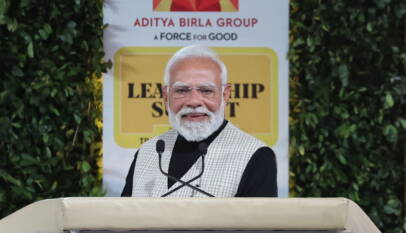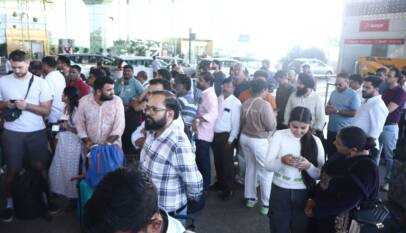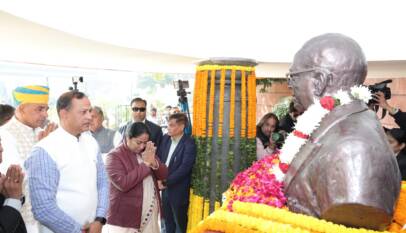India’s semiconductor ecosystem will provide solutions for both domestic & global challenges: PM Modi
Greater Noida : Prime Minister Narendra Modi inaugurated SEMICON India 2024 at the India Expo Mart in Greater Noida, Uttar Pradesh, on Wednesday. In his address, PM Modi highlighted that India’s semiconductor ecosystem is poised to provide solutions not only for domestic challenges but also for global needs.
Addressing the gathering, PM Modi stated, “For India, a chip is not just a piece of technology; it is a means to fulfill the aspirations of millions.” He emphasized the importance of preparing India’s students and professionals for the semiconductor industry, reflecting the nation’s commitment to becoming a leader in this field.
The Prime Minister mentioned that India’s proactive policies have attracted investments exceeding Rs 1.5 trillion in the semiconductor sector in a short span. He detailed the government’s 360-degree approach to advancing the entire semiconductor supply chain ecosystem in the country.
Referring to his earlier remarks from the Red Fort, PM Modi reiterated the nation’s ambitious goal: to ensure that every device in the world contains an Indian-made chip. He affirmed India’s determination to take all necessary steps to realise this vision and become a semiconductor powerhouse.
Before the inauguration, PM Modi toured the exhibition, where he was briefed on various semiconductor-based devices and innovations.
The Prime Minister said that India is the eighth country in the world to organize an event related to the global semiconductor industry. “This is the right time to be in India. You are at the right place at the right time”, he emphasized. “In 21st-century India, the chips are never down. And even if they are, you can always bet on India”, he quipped.
Drawing an analogy between the semiconductor industry and a diode, where energy flows in only one direction, PM Modi emphasized that India’s semiconductor sector is unique, featuring special “diodes” where energy flows in both directions. He explained that while industries invest and generate value, the government reciprocates by offering stable policies and promoting Ease of Doing Business.
The Prime Minister said that India provides an integrated ecosystem drawing parallels with an integrated circuit used in the semiconductor industry and highlighted the much-discussed talent of India’s designers. He then highlighted India’s significant contribution to the global design industry, noting that it currently stands at 20 percent and continues to grow.
He said that India is building a robust semiconductor workforce comprising 85,000 technicians, engineers, and R&D experts, with a strong focus on preparing students and professionals to be industry-ready.
Reflecting on the first meeting of the Anusandhan National Research Foundation held lately, PM Modi emphasized its role in providing new direction and energy to India’s research ecosystem. He also mentioned the establishment of a special research fund of Rs 1 trillion.
PM Modi emphasized the strategic advantages offered by the Government of India’s semiconductor policies and the investor-friendly environment. He highlighted a “three-dimensional power” that India possesses: first, a reformist government; second, a rapidly expanding manufacturing base; and third, a large, aspirational market that appreciates and embraces technology.
PM Modi pointed out that India’s tech-savvy and aspirational society is unique, with chips serving not just as technological components, but as a means to fulfill the aspirations of millions. He said that India is one of the largest consumers of semiconductors, which has enabled the creation of world-class digital public infrastructure.
This small chip, he said, plays a crucial role in ensuring last-mile delivery across the country. He cited the example of India’s banking system, which remained resilient during the COVID-19 crisis when even some of the world’s strongest banking systems faltered.
From UPI and Rupay Cards to DigiLocker and DigiYatra, PM Modi emphasized that various digital platforms have become integral to the daily lives of Indians. He added that as India ramps up manufacturing across all sectors to achieve self-reliance, the nation is also undertaking a large-scale green transition. “With the growing demand for data centers, India is poised to play a significant role in driving the global semiconductor industry forward,” he remarked.
The Prime Minister said: “There is an old saying – ‘Let the chips fall where they may’, that means whatever is going on, let it go on like that but today’s young and aspirational India does not follow this sentiment. India’s new mantra is increasing the number of chips produced in India and the government has taken significant steps to promote semiconductor manufacturing.”
PM Modi highlighted that the Government of India is offering 50 percent support for establishing semiconductor manufacturing facilities, with state governments also contributing at their levels. He praised the Semicon India program as an exemplary initiative, providing financial support for various aspects of the semiconductor industry, including front-end fabs, display fabs, semiconductor packaging, compound semiconductors, sensors, and display manufacturing.
The PM highlighted the government’s strategic focus on securing critical minerals essential for the semiconductor industry, highlighting the recently launched Critical Mineral Mission aimed at boosting both domestic production and overseas acquisition of these vital resources. He emphasized that India is working rapidly on customs duty exemptions and mining auctions for critical minerals.
He also shared plans to establish a Semiconductor Research Center at the Indian Institute of Space Sciences in collaboration with IITs. This center will focus on producing not only high-tech chips for current needs but also developing next-generation chips, positioning India at the forefront of semiconductor innovation.
Talking about international collaborations the Prime Minister recalled ‘Oil Diplomacy’ and said that the world today is stepping into to an era of ‘Silicon Diplomacy.’ He informed that India has been selected as the Vice Chair of the Indo-Pacific Economic Framework’s Supply Chain Council and is a key partner in the QUAD Semiconductor Supply Chain Initiative.
Additionally, India has signed agreements with countries like Japan and Singapore and is deepening its cooperation with the United States in the semiconductor sector.
The PM mentioned that the Digital India Mission aimed to provide the country with a transparent, effective and leakage-free governance and its multiplier effect can be experienced today. For the success of Digital India, he said that necessary reforms and infrastructure were initiated to make mobile handsets and data affordable in India.
He noted that India was one of the largest importers of mobile phones a decade ago while today, it is the world’s second-largest producer and exporter of mobile phones. He cited India’s rapid progress, particularly in the 5G handset market and stated that India is now the second-largest market for 5G handsets globally, just two years after the rollout of 5G.
With India’s electronics sector now valued at over $150 billion, the Prime Minister outlined a larger goal to grow the country’s electronics sector to $500 billion and create 6 million jobs by the end of this decade. He said that this growth will directly benefit India’s semiconductor sector.
“Our goal is that 100% of electronic manufacturing should happen in India. India will make semiconductor chips and the finished product too. Whether it is mobile manufacturing, electronics, or semiconductors, our focus is clear—we want to build a world that doesn’t stop or pause in times of crisis but keeps forging ahead”, he added.
On this occasion, Chief Minister Yogi Adityanath, Union Minister Ashwani Vaishnav, Jitin Prasad, MP Mahesh Sharma, BJP State President Bhupendra Chaudhary, global leaders, CEOs and experts from the semiconductor industry from across the world were present.
Your Legal Rights When a Flight Is Delayed or Cancelled in India
New Delhi, Dec 5: With widespread flight disruptions continuing to affect air travel acros…




















